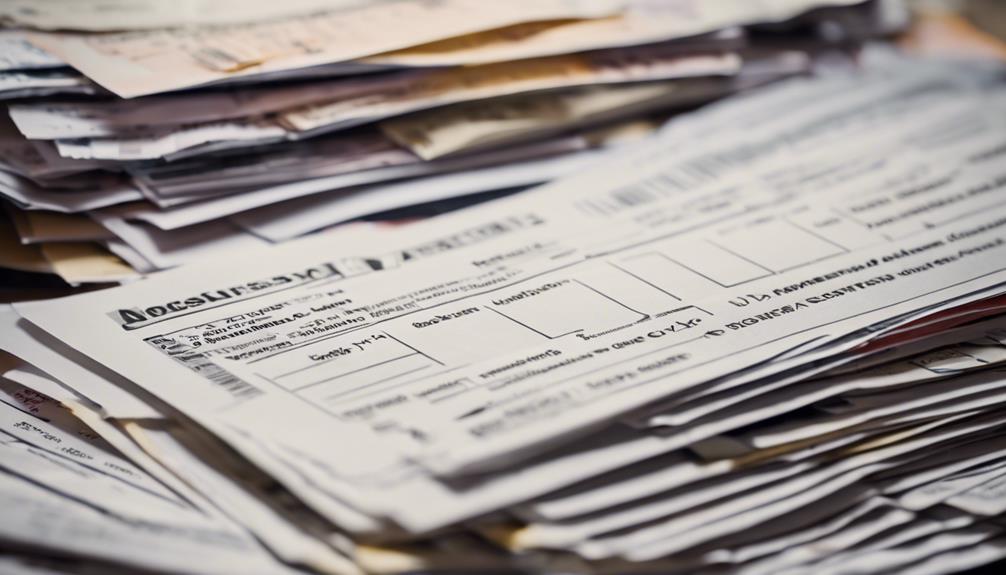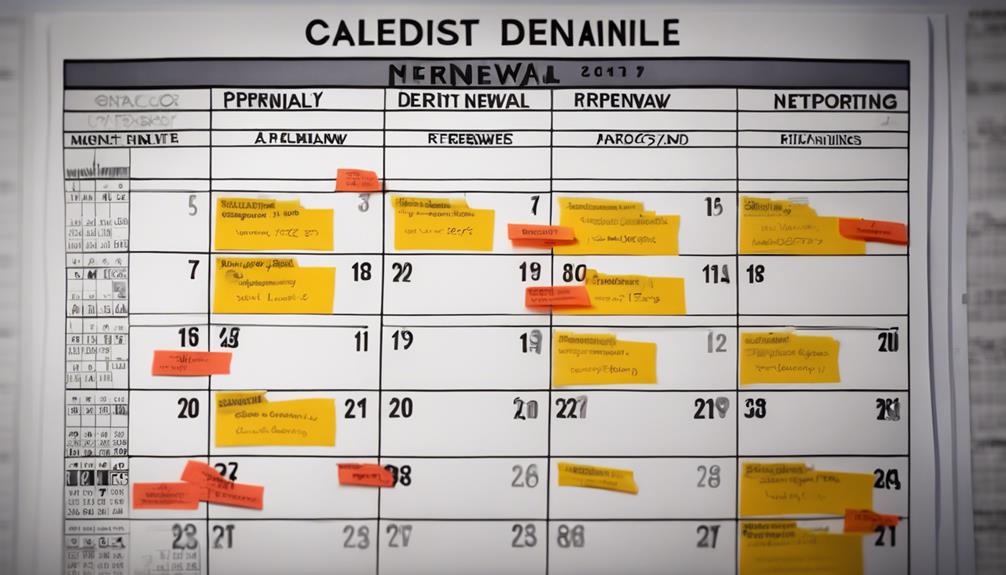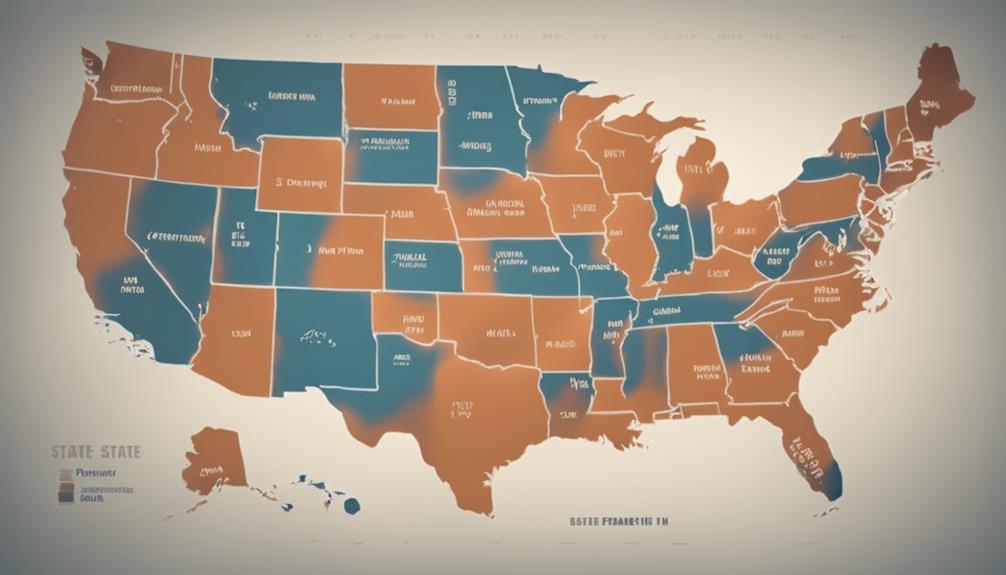Are you aware of the crucial details needed to secure state-specific permits for your business operations in a different state? Understanding the key requirements for non-resident operations is essential, but have you considered the potential complexities involved in meeting these obligations across various states?
Stay tuned to discover the vital elements that can impact your business's ability to operate legally outside your home state.
Key Takeaways
- Obtain industry-specific permits for legal compliance in Texas.
- Failure to secure permits can result in penalties or business suspension.
- Thorough research is crucial to identify all necessary permits.
- Adhere to renewal requirements and tax obligations to avoid disruptions.
Overview of Non-Resident Business Permits
Non-resident businesses seeking to operate within Texas must secure specific permits to ensure legal compliance with state regulations and laws governing business activities. These permits, often referred to as business licenses, are essential for out-of-state or foreign entities wishing to conduct business in Texas. Failure to obtain the required permits can lead to severe legal consequences, including penalties, fines, or other sanctions. It's imperative for non-resident businesses to understand the unique permit requirements based on the type of business and industry they operate in.
In Texas, the process of obtaining business permits for non-resident businesses is crucial for maintaining compliance with state regulations. Each industry may have specific permit requirements, and it's the responsibility of the non-resident businesses to ensure they've the necessary permits before commencing operations. By adhering to these permit regulations, non-resident businesses can avoid legal pitfalls and operate within the bounds of the law, fostering a sense of belonging and legitimacy within the Texas business landscape.
Types of State-Specific Permits

State-specific permits required for non-resident business operations encompass a range of licenses tailored to ensure compliance with state regulations and industry-specific requirements. These permits include sales tax permits, professional licenses, and special industry permits, all vital for businesses operating outside their registered state.
In addition to these common permits, certain states may have unique requirements such as alcohol licenses, health department permits, and environmental permits. Obtaining these permits is crucial for non-resident businesses to operate legally and adhere to state regulations. Failure to secure the necessary state-specific permits can lead to fines, penalties, or even the suspension of business activities.
It's imperative for non-resident businesses to thoroughly research and obtain all applicable state-specific permits to avoid any legal complications and ensure smooth operations within the state.
Permit Application Process
You must meticulously prepare the required documents listed for your permit application in Texas.
Be aware of the application fee details associated with the permits you're seeking.
Understand the processing timeframe expectations to plan your non-resident business operations effectively.
Required Documents List
The submission of a completed permit application form with all required information is the initial step in the process of applying for non-resident business operation permits. To fulfill legal requirements, you must provide proof of business registration and compliance with state regulations.
Additionally, include financial statements, business plans, and any necessary permits or certifications specific to the state. Furnish documentation demonstrating insurance coverage and bonding requirements to safeguard business operations. Remember that all documents must be notarized and submitted following state-specific guidelines meticulously.
Ensuring the accuracy and completeness of these documents is crucial for a successful permit application process.
Application Fee Details
Application fees for non-resident business permits in Texas vary depending on the specific type of permit required, with a range from $50 to $500 or higher. These fees may also include processing fees or renewal fees, depending on the permit type.
To obtain detailed information about the fees associated with a particular permit application, applicants should thoroughly review the application forms provided by the Texas regulatory authorities. Understanding and meeting the fee requirements outlined in the application forms is essential to ensure a smooth and timely application process.
Processing Timeframe Expectations
When can non-resident business operators anticipate the processing timeframe for state-specific permits? Understanding the processing times is crucial for non-resident business operations to plan effectively.
Here are some key points to consider:
- Processing times vary based on the type of permit and specific state requirements.
- Some permits may be expedited within a few weeks, while others might take several months due to additional documentation needs.
- Delays in the application process can impact the start date for business operations in a new state.
- It's essential to be aware of the expected processing timeframe to ensure compliance with state regulations and timely initiation of non-resident business activities.
Key Documentation Requirements

For successful application submission, ensure all required documentation is accurately completed and attached. Non-resident businesses seeking state-specific permits in Texas must provide proof of registration in their home state. This entails submitting essential documentation such as articles of organization or incorporation for verification. Foreign entities operating in Texas are also required to demonstrate compliance with the business laws of their home state.
Moreover, it's imperative to include supporting documentation that outlines the business structure and ownership details. These details are crucial for the application process and play a significant role in the permit approval decision. Failing to provide clear and accurate documentation may result in delays or even rejection of the permit application. Therefore, meticulous attention to detail in compiling and submitting these documents is paramount for non-resident businesses looking to operate in Texas seamlessly.
Compliance With State Regulations

You must ensure compliance with state regulations when operating a non-resident business in Texas. This involves obtaining the necessary permits, licenses, and registrations based on your business activities.
Failure to meet these requirements can lead to severe consequences such as fines, penalties, or business closures.
State-Specific Permit Overview
Non-resident businesses must acquire state-specific permits in Texas to ensure compliance with the state's licensing requirements. When delving into the specifics of these permits, consider the following:
- Research Industry Requirements: Permits may vary by industry, necessitating thorough research to understand the specific permits needed for your business activities.
- Understand Permit Variations: Different business activities may require different permits; therefore, it's crucial to comprehend the variations and their implications.
- Legal Consequences of Non-Compliance: Failure to obtain necessary state-specific permits can lead to legal repercussions, including penalties and potential business disruptions.
- Adherence to State Regulations: To operate legally in Texas, non-resident businesses must comply with state regulations to avoid facing adverse consequences.
Key Compliance Requirements
Compliance with state regulations in Texas is paramount for non-resident businesses looking to operate legally and avoid potential penalties or business disruptions. To ensure compliance, non-resident businesses must navigate the requirements set forth by various Texas authorities such as the Texas Department, Comptroller of Public Accounts, and Secretary of State. Obtaining the necessary Texas Business Licensing for a foreign business entity involves submitting specific legal documents and obtaining required permits and licenses. Failure to adhere to these regulations can result in severe consequences, including fines or even the suspension of business activities. By demonstrating a commitment to compliance, non-resident businesses not only operate within the confines of the law but also build trust with regulators and customers.
| Texas Authorities | Compliance Requirements |
|---|---|
| Texas Department | Obtain necessary permits and licenses |
| Comptroller of Public Accounts | Submit required financial documentation |
| Secretary of State | File appropriate legal forms |
| Texas Business Licensing | Complete registration process |
| Foreign Business Entity | Adhere to state-specific regulations |
Regulatory Adherence Importance
Ensuring strict adherence to state regulations is imperative for businesses aiming to avoid potential penalties and maintain operational legality. Non-resident businesses must prioritize compliance with state regulations to uphold their legal standing and prevent fines or penalties.
To achieve this, consider the following key points:
- Obtain the necessary state-specific permits to operate legally within the state.
- Regularly monitor and stay informed about regulatory changes to ensure ongoing compliance.
- Failure to adhere to state regulations can result in severe consequences such as permit suspension or revocation.
- Understanding and following state regulations not only ensure smooth business operations but also contribute to maintaining a positive legal standing.
Permit Renewal and Reporting Obligations

When renewing permits for non-resident business operations, it's essential to meticulously adhere to state-specific requirements to prevent disruptions in your business activities. Permit renewal processes vary by state and may entail annual renewals or updates, necessitating a thorough understanding of the state-specific requirements.
Reporting obligations for non-resident business operations involve providing updated information to state authorities, ensuring ongoing compliance with regulations. Failure to renew permits or meet reporting obligations can result in penalties or suspension of business activities, emphasizing the importance of timely and accurate submissions.
Some states may mandate specific documentation or fees for permit renewals and reporting, underscoring the need for attention to detail in these processes. Therefore, understanding and fulfilling state-specific permit renewal and reporting obligations are critical for maintaining compliance and avoiding potential disruptions in your business operations.
Stay informed and proactive to safeguard the continuity of your non-resident business activities.
Understanding State Franchise Taxes

Understanding state franchise taxes involves navigating the complex web of financial obligations imposed on businesses operating within a specific state. When it comes to Texas, a state that imposes a franchise tax, businesses must grasp the intricacies of this levy to ensure compliance and avoid penalties.
Here are key points to consider regarding state franchise taxes in Texas:
- Tax Basis: The Texas franchise tax is typically based on a business entity's margin or net taxable capital, with rates and calculations varying depending on the type of entity.
- Exemptions: Certain entities, such as nonprofits and specific types of corporations, may qualify for exemptions from state franchise taxes in Texas, but eligibility criteria must be met.
- Compliance Requirements: Non-resident businesses operating in Texas must understand and adhere to state franchise tax requirements to maintain good standing and avoid potential penalties.
- Penalties: Failure to comply with Texas franchise tax regulations can lead to penalties, making it essential for businesses to stay informed and fulfill their tax obligations promptly.
Frequently Asked Questions
Do I Need a Business License if I Have an LLC in Texas?
If you have an LLC in Texas, having an LLC doesn't automatically exempt you from needing a business license. Your LLC regulations may not cover all required permits for your business activities.
To ensure compliance with state requirements and tax obligations, research industry-specific licensing requirements. Make sure to have a compliance checklist for non-resident operations and be aware of any permit exemptions that may apply.
What Licenses and Permits Are Needed to Start a Business in Illinois?
To start a business in Illinois, you must obtain state-specific licenses and permits for non-resident business operations. Research Illinois requirements, understand the licensing process, and ensure regulatory compliance.
Apply for necessary permits, following state-specific rules. It's crucial to abide by all regulations to operate legally. Conduct thorough research to acquire the correct licenses before commencing business operations in Illinois.
Does Harris County TX Require a Business License?
In Harris County, TX, a general business license isn't mandatory for most businesses. However, specific permits or licenses may be required based on your industry or activities.
Ensure compliance with Harris County regulations by researching if your business needs any permits or licenses. Contact the Harris County Clerk's Office or the relevant department for guidance.
Compliance with health, safety, and environmental regulations is crucial for non-resident business operations in Harris County.
Do I Need a Business License in Texas to Sell Online?
You need a Sales and Use Tax Permit to sell online in Texas. Compliance with state tax regulations is essential for Internet businesses. Failure to obtain the necessary permits can halt your operations. CT Corporation can help secure the required licenses.
Understanding and meeting your online business tax obligations is crucial for legal operation in Texas. Make sure to adhere to e-commerce regulations and state-specific retail licensing requirements to avoid issues.
Conclusion
Congratulations! You've navigated the complex world of state-specific permits for non-resident business operations. Remember, compliance is key to avoiding penalties and keeping your business running smoothly.
So, keep those permits up to date, file those annual reports, and watch out for those pesky late filing fees. Stay on top of your game, and your business will thrive in the legal jungle of interstate commerce.
Happy permit hunting!